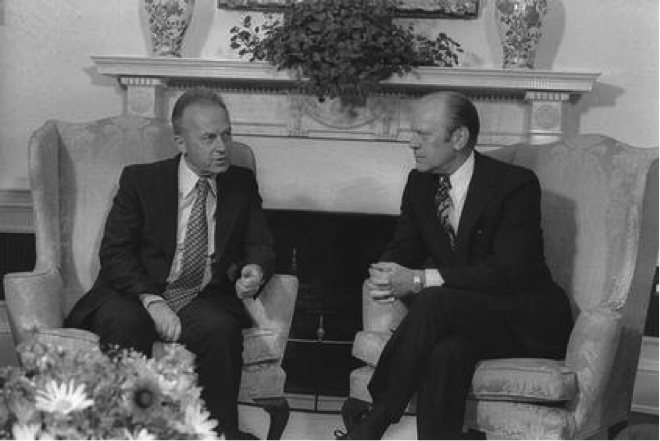May 22, 1975
After the October 1973 Yom Kippur War, Secretary of State Henry Kissinger engaged in “shuttle diplomacy” between Israel and its neighbors. Kissinger’s efforts led to a Sinai disengagement agreement between Israel and Egypt in January 1974 and to a disengagement agreement on the Golan Heights between Israel and Syria in May 1974. In 1975, the United States sought to secure a second agreement between Egypt and Israel, again regarding the Sinai Peninsula.
Beginning in March 1975, the new round of shuttle diplomacy did not go smoothly. Israel and the United States had new leaders in Yitzhak Rabin and President Gerald Ford. Talks broke down over Israeli withdrawal from oil fields in the Sinai, Egyptian unwillingness to enter into a nonbelligerency agreement and the use of the Suez Canal by Israeli ships. The final meeting between Kissinger and Rabin ended poorly and led to Ford writing Rabin:
I wish to express my profound disappointment over Israel’s attitude during the course of the negotiations. … I have given instructions for a reassessment of United States policy in the region, including our relations with Israel, with the aim of ensuring that our overall American interests are protected.
This reassessment resulted in the suspension of economic assistance and a reduction of arms supplied to Israel.
In response, 76 U.S. senators write to the president, stressing that
we believe that preserving the peace requires that Israel obtain a level of military and economic support adequate to deter a renewal of war by Israel’s neighbors. Withholding military equipment from Israel would be dangerous, discouraging accommodation by Israel’s neighbors and encouraging a resort to force.
After the letter, Sen. Henry Jackson, a Democrat from Washington, adds an amendment to a defense procurement bill to stipulate that Israel would receive supplies of American weaponry at low interest rates. Negotiations resume in the summer of 1975, and a second Egyptian-Israeli disengagement agreement is signed in September.










